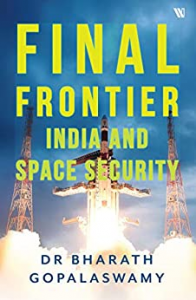
The book “Final Frontier: India and Space Security” is written by Dr Bharath Gopalaswamy and published by Westland Publications Private Limited, Chennai. Its primary focus revolves around the dynamic nature of warfare and the need for the militarisation of space by India. According to the author, the shift in the aerial frontier during the end of the First World War, from reconnaissance and information gathering to artillery guns and bombings along with advances in aircraft technology played a major role in the development of space exploration. The Cold War seemed to act as a catalyst in the process for powerful nations like The United States and the erstwhile Soviet Union in terms of securing national interests in the domain of space. India on the other hand has gradually modernised its defence and seems to have accepted the Revolution in Military Affairs which includes technological advancements in war and the growing need for space and cyber assets.
The first chapter of the book gives an overview of the origins of India’s space programme. Unlike most countries in the 20th Century, India chose a civil administrative body to handle it’s space affairs and planned to use it for the socio-economic development of the country. This peculiar space programme led to strengthening its status as a leading member of the Non-Aligned Movement, aiding in research related projects with the United States as well as the Soviet Union. Dr Gopalaswamy also mentions the potential use of satellites as a means of communication through Television and other broadcasting methods at that time. The major political factor, according to the author, that led to a shift in India’s space programme was the 1971 Bangladesh war but it has not been clearly mentioned as to what kind of security threat led to that change. As we go further into the chapter, a brief history about the various departments that handle India’s space programme are mentioned along with a set timeline of events that function as background information.
Much of the following chapters follow a similar theme of providing extensive overviews on various important fields like remote-sensing and navigation among others. Technical aspects of these satellites and the development of the said technology in various major countries, namely The United States, China and Russia are provided to the reader to gain a better understanding of the subject at hand. While mentioning Arms Race in space, the author mentions “Many countries and organisations fear an arms race in space could pose a serious risk to military-support assets in space, and also endanger critical civilian space infrastructure—including communications, navigation, and research”. Although deterrence seems to be a better choice when it comes to space militarisation, the rapid growth and advancement of space weaponry in key nations makes it a “necessity” for India to follow a similar path. One such development, according to the author, is China’s ASAT( Anti-Satellite Weapon) test which prompted a sudden and swift reaction by the Indian Government towards its space programme. Recently, with its very own demonstration of ASAT capabilities, India under the present government might be diverging from its primary civilian roots towards a weaponized space programme.
The last few chapters delve into Governance, law and situational awareness of space. According to Dr Gopalaswamy “Space Situational Awareness can be functionally defined as the protection of space assets through monitoring and prediction of space objects or conditions that can, intentionally or unintentionally, cause damage to the assets”. The chapter then dives into India’s SSA capabilities and the potential for the military use of ISRO’s indigenous Multi-Object Tracking Radar(MOTR). After analysing the global code of conduct for outer space and the lack of national laws for space the book concludes by mentioning the need for self-dependency of the country’s space regime in today’s world.
The Author sports a more neorealist perspective when it comes to the dire need for space militarization or weaponization as a result of strategic interests and growing technological advancements by countries, as mentioned in the book, like China, the United States and so on. Although the book does give a detailed insight into the changing perspectives on space regimes around the world, it also acts as a factual piece revolving around the history, science and capabilities of some specific nations as a sort of comparison. There has not been enough information provided regarding the development of India’s ASAT test which seems to be a major feat in its militarised space capabilities. Even though it has been mentioned that most nations prefer a less weaponized space, the author hints at an inevitable dependency on space-related assets and security due to the growing arms race in this sector( for example: The ASAT test and India’s lack of SSA capabilities at the time) which will lead to a less secure and highly volatile space programme.
Ultimately, the need or necessity of being a leading spacefaring nation can be treated as a highly contested subject matter but the book does act as a faithful guide with its more factual overviews regarding the Indian space programme and its development over the years.















